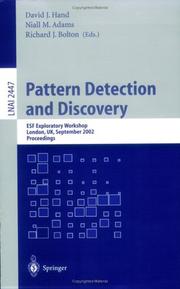| Listing 1 - 1 of 1 |
Sort by
|

ISBN: 3540457283 3540441484 Year: 2002 Publisher: Berlin, Heidelberg : Springer Berlin Heidelberg : Imprint: Springer,
Abstract | Keywords | Export | Availability | Bookmark
 Loading...
Loading...Choose an application
- Reference Manager
- EndNote
- RefWorks (Direct export to RefWorks)
The collation of large electronic databases of scienti?c and commercial infor- tion has led to a dramatic growth of interest in methods for discovering struc- res in such databases. These methods often go under the general name of data mining. One important subdiscipline within data mining is concerned with the identi?cation and detection of anomalous, interesting, unusual, or valuable - cords or groups of records, which we call patterns. Familiar examples are the detection of fraud in credit-card transactions, of particular coincident purchases in supermarket transactions, of important nucleotide sequences in gene sequence analysis, and of characteristic traces in EEG records. Tools for the detection of such patterns have been developed within the data mining community, but also within other research communities, typically without an awareness that the - sic problem was common to many disciplines. This is not unreasonable: each of these disciplines has a large literature of its own, and a literature which is growing rapidly. Keeping up with any one of these is di?cult enough, let alone keeping up with others as well, which may in any case be couched in an - familiar technical language. But, of course, this means that opportunities are being lost, discoveries relating to the common problem made in one area are not transferred to the other area, and breakthroughs and problem solutions are being rediscovered, or not discovered for a long time, meaning that e?ort is being wasted and opportunities may be lost.
Data mining --- Pattern recognition systems --- Computer Science --- Mechanical Engineering - General --- Mechanical Engineering --- Engineering & Applied Sciences --- Computer science. --- File organization (Computer science). --- Algorithms. --- Mathematical statistics. --- Database management. --- Information storage and retrieval. --- Artificial intelligence. --- Computer Science. --- Database Management. --- Artificial Intelligence (incl. Robotics). --- Algorithm Analysis and Problem Complexity. --- Files. --- Probability and Statistics in Computer Science. --- Information Storage and Retrieval. --- Computer software. --- Data structures (Computer scienc. --- Information storage and retrieva. --- Artificial Intelligence. --- Data Structures and Information Theory. --- Information storage and retrieval systems. --- Data structures (Computer science). --- AI (Artificial intelligence) --- Artificial thinking --- Electronic brains --- Intellectronics --- Intelligence, Artificial --- Intelligent machines --- Machine intelligence --- Thinking, Artificial --- Bionics --- Cognitive science --- Digital computer simulation --- Electronic data processing --- Logic machines --- Machine theory --- Self-organizing systems --- Simulation methods --- Fifth generation computers --- Neural computers --- Data base management --- Data services (Database management) --- Database management services --- DBMS (Computer science) --- Generalized data management systems --- Services, Database management --- Systems, Database management --- Systems, Generalized database management --- Mathematics --- Statistical inference --- Statistics, Mathematical --- Statistics --- Probabilities --- Sampling (Statistics) --- Information structures (Computer science) --- Structures, Data (Computer science) --- Structures, Information (Computer science) --- File organization (Computer science) --- Abstract data types (Computer science) --- Algorism --- Algebra --- Arithmetic --- Statistical methods --- Foundations
| Listing 1 - 1 of 1 |
Sort by
|

 Search
Search Feedback
Feedback About UniCat
About UniCat  Help
Help News
News